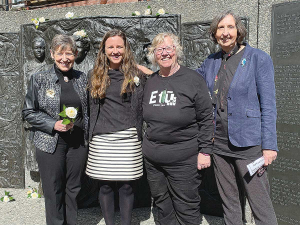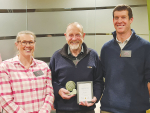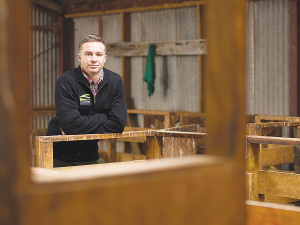This year's Kate Sheppard Memorial Award recipient will support research to ultimately help New Zealand farmers choose forages for best production and drought resistance.
Twenty-eight year old Laura Keenan picked up the 2020 award for her PhD research into yield prediction tools for a national forage database. Named in honour of the women’s suffrage pioneer Kate Sheppard, the award aims to support a woman in further education, study, research or training, in areas which are of value to New Zealand.
Keenan’s research is part of the Hill Country Futures Project aimed at collating both published and non-published data around non-traditional forages – either as mixes or monocultures in pasture. She is looking specifically at plantain as well as white and red clover.
“That’s all I could fit into my PhD, but my colleagues at Lincoln University are working on other species so that there is a full data set,” she told Rural News. “Essentially there will be a whole lot more information for farmers around alternative forages to perennial ryegrass and white clover.”
Keenan acknowledges that red and white clover have been around for a long time, and plantains have been getting a lot of traction recently, particularly on dairy farms.
However, she believes what’s been missing is a lot of collaboration in getting data out to the industry.
“That’s where my project is great because it’s working in a collaborative fashion with the Crown Research Institutes, with the educational institutes like Massey and Lincoln and then also working with commercial companies to compile national datasets,” she explains.
“They have a whole lot of reliability because there is so much data sitting behind them. But they haven’t been collaborated in a way which is really farmer-friendly so that’s what I’m trying to do – gather all that data into one place so that farmers can have some reliability about the decisions that they’re making.”
The project is looking primarily at sheep and beef and dairy systems, throughout all regions and environments.
Keenan says the data will be “ground-truthed” against abiotic factors such as climate and water.
“When you’re thinking about farming and the different things you can do to enhance the farm bottom line, forages play a huge part in that in terms of return on investment,” she told Rural News.
“The national forage database will enable farmers to make a whole lot better decisions when it comes to incorporating these species on farm.”
A continuing high achiever
Raised in Southland, Laura Keenan graduated with Honours in Agricultural Science from Lincoln University in 2014.
She worked as an environmental consultant in Canterbury for three years and then joined seed company Agricom, as territory manager for the Western North Island, based in Palmerston North. She started her three-year PhD programme in June, dividing her time between Lincoln and her home, which is now a farm near Feilding.
Keenan is a member of the Central Districts NZIPIM branch and was named that organisation’s Emerging Rural Professional of the year in 2017. She used that prize package to successfully complete a Kellogg Rural Leadership Program in 2019.
Keenan is also on the New Zealand Grassland Association executive committee and is one of the founders of the Women in Agribusiness initiative.
“I am privileged and humbled to receive the award (Kate Sheppard), which takes the form of a $3000 grant,” she told Rural News.
Trust chair Karena Brown said it was very pleased to be able to assist talented women achieve their dreams.
“Given the importance of food production around the world, the research being undertaken by this year’s recipient will be very important not only to New Zealand but to overseas as well. We are sure that Kate Sheppard would be proud to lend her name to such a worthwhile area of study.”



















